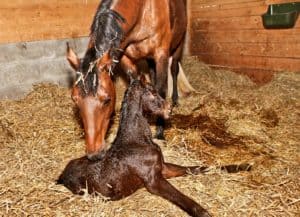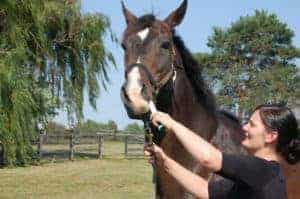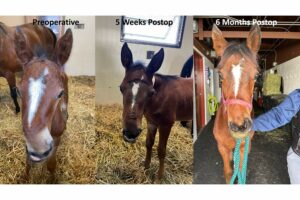Earthworms Might Be Critical Reservoir for Disease-Causing R. equi

Rhodococcus equi, which can cause severe pneumonia in foals, survives in the soil after infected horses, pigs, and wild boars shed it in their feces. But a group of researchers in Japan believes we might be overlooking a significant additional reservoir: earthworms.
Earthworms can ingest R. equi, including the virulent strains that cause disease in horses, in the soil they eat. Because of optimal conditions in the worms’ digestive systems, the bacteria can reproduce abundantly—up to “several tens of times”—before getting released back into the soil through earthworm feces, said Shinji Takai, DVM, PhD, of the Laboratory of Animal Hygiene at Kitasato University School of Veterinary Medicine, in Towada, Japan.
“We think that R. equi is multiplying inside the earthworms’ guts,” Takai said. “The unique anaerobic (not requiring oxygen) state of the earthworm gut provides a microenvironment that is favorable for anaerobic and/or facultative anaerobic bacteria.”
Takai and his fellow researchers isolated R. equi from the digestive contents of 170 earthworms and from 47 nearby soil samples collected from two horse breeding farm pastures, outdoor pig pens, the school campus forest, and a forest and orange grove where wild boars live, all in Japan. Some of the isolates harbored VapA and VapB genes—which are specifically related to clinical signs of disease in horses, he said.
They compared the relative amounts of R. equi in the upper versus the lower gut of 23 earthworms and found, on average, up to three times the number of bacteria in the lower regions—suggesting the bacteria were reproducing inside the worms. In fact, the R. equi abundance was nearly 40 times greater in the lower gut than in the surrounding soil.
“Consequently, the abundant amount of nutrients in the earthworm gut compared with soil might be favorable for the growth of R. equi and other animal pathogens,” the team reported in the Letters in Applied Microbiology report.
The bacteria do not seem to infect the worms, Takai explained. Rather, they become one of the worms’ many intestinal bacteria.
Horses generally pick up R. equi by breathing it in from the soil, Takai said. So although they’re not likely to acquire R. equi directly from the earthworms, the earthworms are probably keeping the bacterial presence active in the soil. In addition, wild boars eat earthworms and could contribute to supporting higher bacterial burdens in the environment.
“Earthworms shed feces containing a large amount of R. equi on the field of horse breeding farms,” he told The Horse. “The soil environment of horse breeding farms with R. equi problems becomes contaminated by not only the discharge or feces of carrier animals but also the earthworms, and the organism is maintained in the soil.”
This does not mean owners should try to eliminate earthworms from their farms, which would be “an irrational approach,” said Takai. Rather, managers should aim to reduce how much bacteria gets “fed” to the earthworms.
“The most important thing is to eliminate the feces of infected foals with R. equi on farms with problems,” he said. “They contain a large amount of virulent R. equi (VapA-positive R. equi). Multiplication of virulent R. equi can occur in the intestinal contents of earthworms and also in the soil and, then, the environment of the farms might get heavily contaminated with virulent R. equi.”
The findings complement prior knowledge about the spread of R. equi, said Takai. “In our previous paper, we mentioned that R. equi could multiply in the soil and flourish in the cycle existing between horses and their soil environment,” he said. “This may have to be corrected as follows: R. equi could multiply in the soil and the intestinal contents of earthworms and flourish in the cycle existing between horses and their soil/earthworm environment.”
“Isolation of Rhodococcus equi from the gastrointestinal contents of earthworms (family Megascolecidae),”appeared in the January 2022 issue of Letters in Applied Microbiology.

Written by:
Christa Lesté-Lasserre, MA
Related Articles
Stay on top of the most recent Horse Health news with















